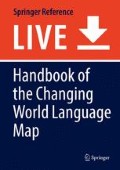Abstract
Educational systems are often slow in reacting to demographic developments, in particular when it comes to accommodating the needs of migrants. Also, traditional language policies – which are supposed to translate into the educational system, curricula, teaching materials, and pedagogy – are often inspired by educational and political ideologies of a regional, national, or international government. They set ideological goals based either on traditional cultural values or on indefinite or idealistic ambitions but are not necessarily grounded in societal fact, reality, or necessity.
The chapter takes issue with language policies and contrasts them with a pragmatic framework of language learning and language use. The pragmatic model of language policies presented here is in line with a linguistic notion of pragmatics as well as with usage-based assumptions of cognitive linguistics.
The chapter (1) describes the predominant orientation of approaches to language teaching; (2) discusses various language policies, such as the traditional lingua cultura and lingua franca approaches, ad hoc policies to cope with mass migration, and migrant language policies such as the rather restrictive French framework, the liberal Swedish model, and the “moderate” German practice; and (3) presents programmatic aspects of a new kind of pragmatic multi-language policy that aims at usable and conceptual competences of a learner rather than abstract and formal knowledge of linguistic structures or euphemistic ideals of international communication standards.
References
Bourdieu, P. (1973). Cultural reproduction and social reproduction. In R. Brown (Ed.), Knowledge, education and social change: Papers in the sociology of education (pp. 257–271). Tavisock: Tavistock Publications.
Bourdieu, P. (1984). Distinction: A social critique of the judgment of taste. Cambridge, MA: Harvard University Press.
Bournot-Trites, M., & Reeder, K. (2001). Interdependence revisited: Mathematics achievement in an intensified French immersion program. The Canadian Modern Language Review, 58(1), 27–43.
Craik, F., Bialystok, E., & Freedman, M. (2010). Delaying the onset of Alzheimer disease. Neurology, 75(19), 1726–1729.
Cummins, J. (1991). Conversational and academic language proficiency in bilingual contexts. Aila Review – Revue de l’Aila, 8, 75–89.
Danesi, M. (2003). Second language teaching. A view from the right side of the brain. Boston: Kluwer.
European Commission, Directorate-General for Education and Culture. (2012). First European survey on language competences: Final report. Luxembourg: Publications Office.
Law Number 2820 (Turkey’s Law on Political Parties) (adopted on April 22, 1983). Published in Resmî Gazette, No. 18027, April 24, 1983. Retrieved 4 June 2018, from http://www.legislationline.org/documents/id/21949
Littlemore, J. (2012). Metaphor and the foreign language learner. In 4th international conference of German cognitive linguistics association, Bremen, October, 9, 2012, Deutsche Gesellschaft für Kognitive Linguistik [German Cognitive Linguistics Association].
Lüdi, G. (2003). Mehrsprachige Repertoires und plurielle Identität von Migranten. Chancen und Probleme. [Multilingual repertoires and plurielle identity of migrants. Opportunities and problems]. In I. de Florio-Hansen & A. Hu (Eds.), Plurilingualität und Identität. Zur Selbst- und Fremdwahrnehmung mehrsprachiger Menschen [Plurilingualism and identity. For self and other perception of multilingual people] (pp. 38–58). Tübingen: Stauffenburg.
Roche, J. (2010). Mutual impact – on the relationship of technology and language learning and teaching. In C. Ward (Ed.), The impact of technology on language learning and teaching: What, how and why (Anthology series 51, pp. 44–62). Singapore: Southeast Asian Ministers of Education Organisation (SEAMEO) Regional Language Centre.
Roche, J. (2013). Mehrsprachigkeitstheorie. Erwerb – Kognition – Transkulturation – Ökologie. [Multilingualism theory. Acquisition – Cognition – Transculturation – Ecology] Tübingen: Narr.
Roche, J., & Scheller, J. (2008). Grammar animations and cognition. In F. Zhang & B. Barber (Eds.), Handbook of research on computer-enhanced language acquisition and learning (pp. 205–218). Hershey: Information Science Reference.
Roche, J., & Suñer, F. (2016). Metaphors and grammar teaching. In J. Goschler & S. Niemeier (Eds.), Applications of cognitive linguistics. Yearbook of the German Association of Cognitive Linguistics (pp. 89–112). New York: Mouton der Gruyter.
Stolle, A.-K. (2013). Integrationspolitik und -praxis im europäischen Vergleich. Theoretische Diskussion und Darstellung anhand exemplarischer Gesetze und bildungspolitischer Richtlinien. [Integration policy and practice in European comparison. Theoretical discussion and presentation based on exemplary laws and educational policy guidelines.]. Zeitschrift für interkulturellen Femdsprachenunterricht [Journal of Intercultural Language Teaching], 18 (1), 146–164.
Taguchi, N. (2009). Pragmatic competence (Mouton series in pragmatics 5). Boston: De Gruyter Mouton.
Wandruszka, M. (1979). Die Mehrsprachigkeit des Menschen [The multilingualism of man]. München: R. Piper & Verlag.
Webber, M. J. (1990). Intercultural stereotypes and the teaching of German. Die Unterrichtspraxis/Teaching German [The Teaching Practice/Teaching German], 23 (2), 132–141.
Web Pages
http://webquest.org/. Accessed 4 June 2018.
http://www.eurocomprehension.eu/. Accessed 8 June 2018.
https://www.goethe.de/de/spr/ueb/him.html. Accessed 4 June 2018.
https://www.podcast.de/. Accessed 4 June 2018.
https://www.visualthesaurus.com/. Accessed 4 June 2018.
Author information
Authors and Affiliations
Corresponding author
Editor information
Editors and Affiliations
Rights and permissions
Copyright information
© 2019 Springer Nature Switzerland AG
About this entry
Cite this entry
Roche, J. (2019). Challenges of (Global) Migration for Language Policies and Language Teaching. In: Brunn, S., Kehrein, R. (eds) Handbook of the Changing World Language Map. Springer, Cham. https://doi.org/10.1007/978-3-319-73400-2_136-1
Download citation
DOI: https://doi.org/10.1007/978-3-319-73400-2_136-1
Received:
Accepted:
Published:
Publisher Name: Springer, Cham
Print ISBN: 978-3-319-73400-2
Online ISBN: 978-3-319-73400-2
eBook Packages: Springer Reference Earth and Environm. ScienceReference Module Physical and Materials ScienceReference Module Earth and Environmental Sciences

